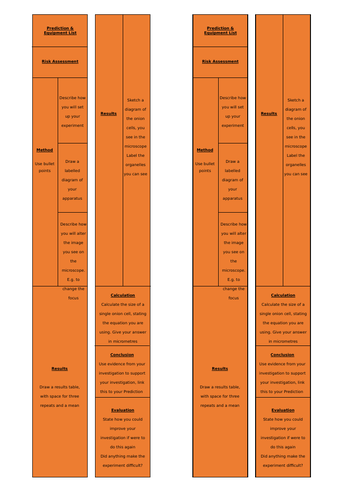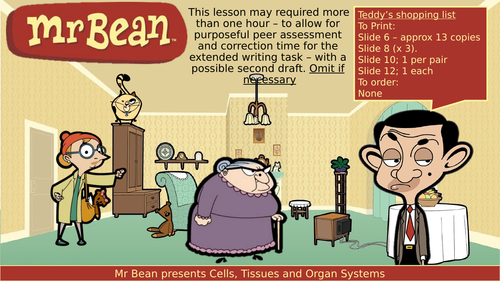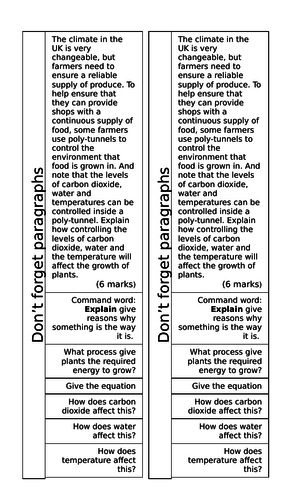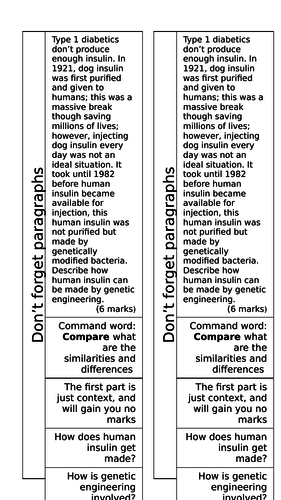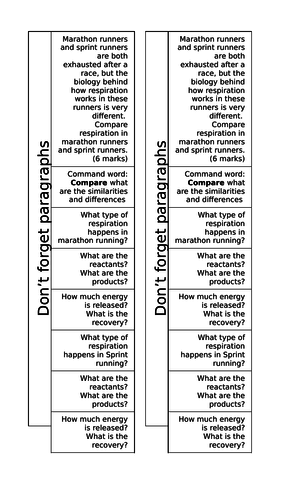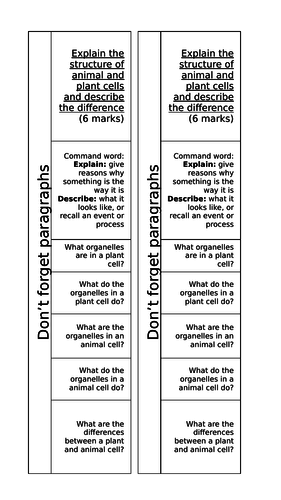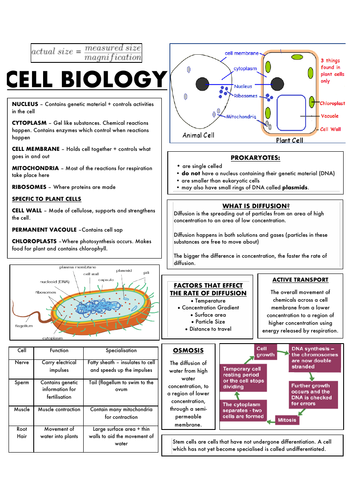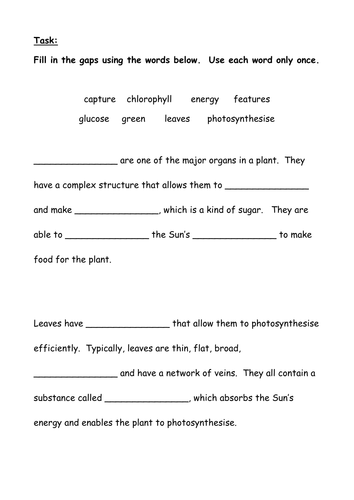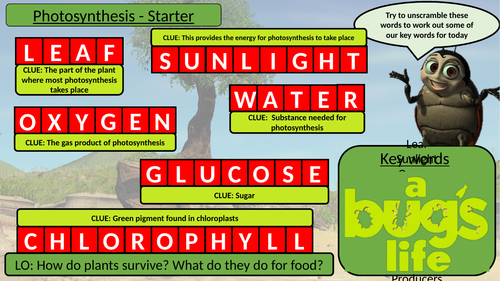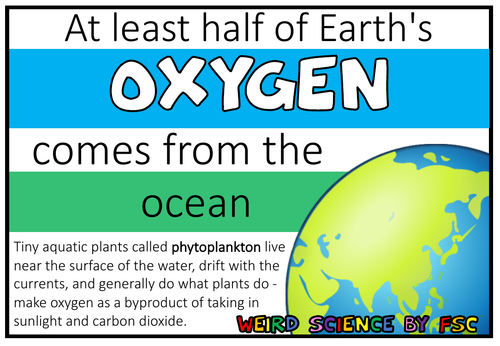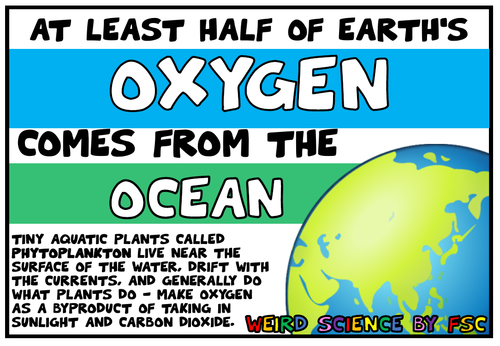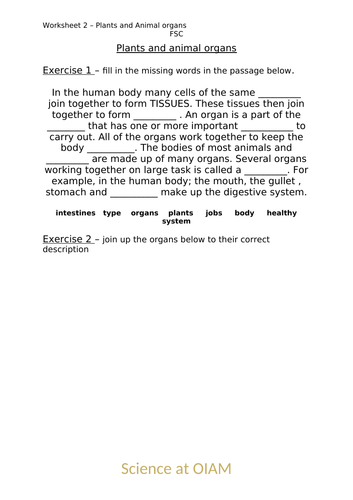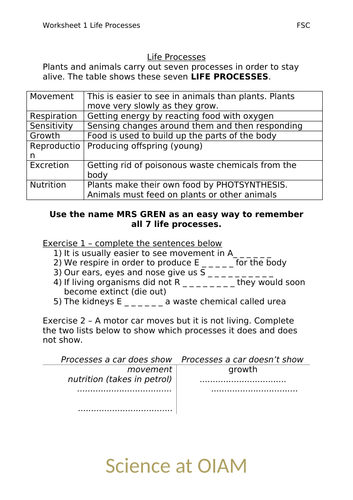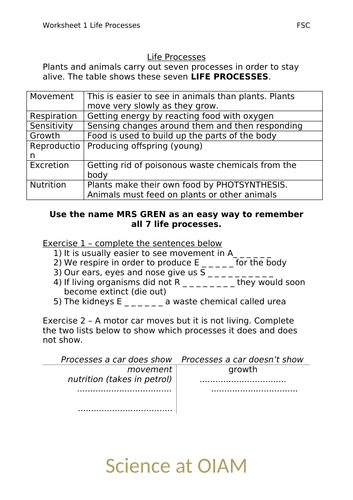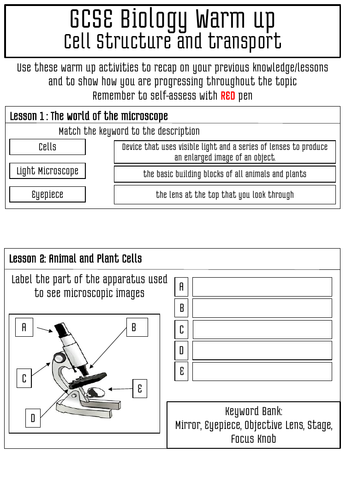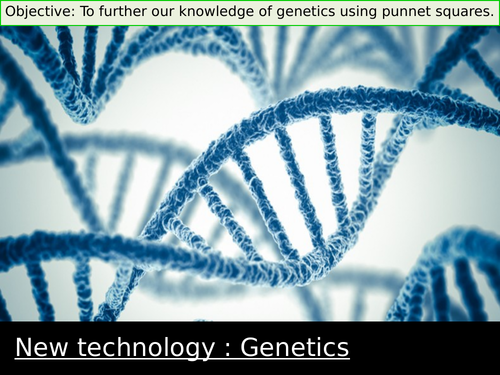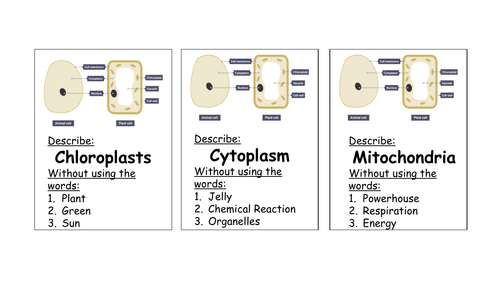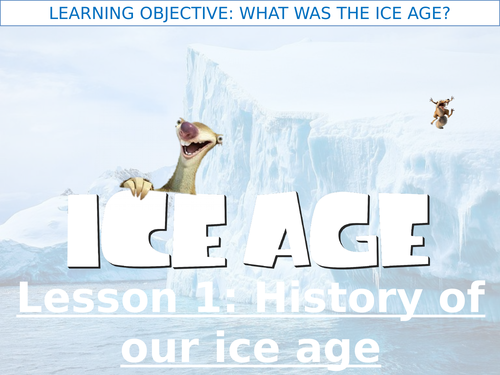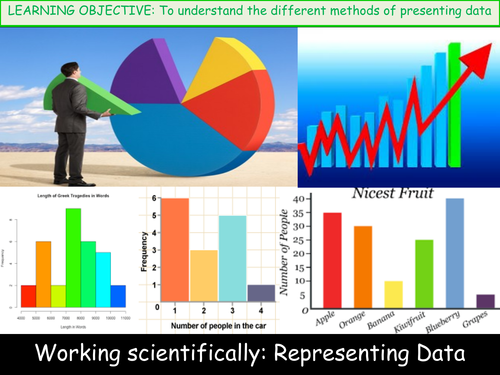
45Uploads
36k+Views
17k+Downloads
Biology

GCSE Biology Required Practicals Writing Strip
Designed to give students the ‘ideal’ structure of a scientific write up, it provides students with a format for what to include in each section, along with tips and success criteria. Each Required practical comes with an edit marking rubric which can be used as teacher feedback; however it is suitable to use as a peer marking grid
Each page has two copies which can printed and stuck in to the margin of the student’s book. The two sheets combined create a well structured and informative double page science write up.
The document is separated in sections for each GCSE Biology Combined Trilogy required practical.

Mr Bean presents Levels of Organisation
A compilation of Levels of Organisation lesson found on TES redesigned to have a theme of Mr Bean. Enjoy!

GCSE Biology Plant Growth - Structure Strip
Introduce the idea of 6 mark questions to your students with this structure strip. Stick it in the margin and off you go! It shows student to thought process through a question, the meaning behind Exam command words. Perfect opportunity to show literacy teaching in science lessons.
More topics will be added.

GCSE Biology Genetic Engineering: Structure Strip
Introduce the idea of 6 mark questions to your students with this structure strip. Stick it in the margin and off you go! It shows student to thought process through a question, the meaning behind Exam command words. Perfect opportunity to show literacy teaching in science lessons.
More topics will be added.

GCSE Biology Respiration: Structure Strip
Introduce the idea of 6 mark questions to your students with this structure strip. Stick it in the margin and off you go! It shows student to thought process through a question, the meaning behind Exam command words. Perfect opportunity to show literacy teaching in science lessons.
More topics will be added.

GCSE Biology Cells: Structure Strip
Introduce the idea of 6 mark questions to your students with this structure strip. Stick it in the margin and off you go! It shows student to thought process through a question, the meaning behind Exam command words. Perfect opportunity to show literacy teaching in science lessons.
More topics will be added.

Revision resource : Cell Biology
Worksheet to aid revision. Contains plenty of extra quick fire questions.

Activate 2 B2.2 Leaves
There is a full lesson , with PowerPoint covering photosynthesis
Levelled objectives are as follows:
•To describe the adaptations of leaves
•To explain the function of the different parts of a leaf
•To evaluate the structure of a leaf as regards to the function of each part
This Document includes resources and learning activities with answers embedded and fully animated into the powerpoint slides. These activities include but not limited to card sorts (included) whiteboard activities - paired work, and literacy tasks
This lesson is also set in the theme of A Bug’s Life.

Activate 2 Lesson 1 Photosynthesis
There is a full lesson , with PowerPoint covering photosynthesis
Levelled objectives are as follows:
•To state the substances needed for photosynthesis
•To describe the process of photosynthesis
•To be able to recall the word equation for photosynthesis
•To describe the process of photosynthesis in detail
•To suggest reasons why photosynthesis would or would not occur
This Document includes resources and learning activities with answers embedded and fully animated into the powerpoint slides. These activities include but not limited to card sorts (included) whiteboard activities - paired work, and literacy tasks
This lesson is also set in the theme of A Bug’s Life.

Free Weird Fact Science Posters
Inspire your students with weird and wacky science facts.
These can be used as a simple display or a starting discussion point if you wish. these are suitable for all ages but geared towards 11-16.
The document is formatted to print at A4.
All feedback is greatly appreciated.
More Poster packs are currently being designed.
Pack 1 is AVAILABLE: https://www.tes.com/teaching-resource/weird-fact-science-posters-pack-1-11963275

Weird Fact Science Posters Pack 1 - 15 POSTERS INCLUDED
Inspire your students with weird and wacky science facts. These can be used as a simple display or a starting discussion point if you wish. these are suitable for all ages but geared towards 11-16.
The document is formatted to print at A4.
All feedback is greatly appreciated.
INCLUDES 15 Posters
More Poster packs are currently being designed.
Pack 2 AVAILABLE HERE: https://www.tes.com/teaching-resource/weird-fact-science-posters-pack-2-11963854

Plant and animal organs
The aim of this resource is to provide complete revision of the topic “Plant and Animal organs” for KS3 Science; which is suited to/ aimed at lower abilities in particular.
This sheet provides pupils with the key facts of a topic and also contains one or more short exercises which have been designed to check pupils’ knowledge and understanding.
This sheet can be used in a number of ways:
to provide quality classwork and homework materials
for end of topic revision
to provide pupils with key facts of a topic they have missed

Life Processes worksheet - SEN
The aim of this resource is to provide complete revision of the topic “Life Processes” for KS3 Science; which is suited to/ aimed at lower abilities in particular.
This sheet provides pupils with the key facts of a topic and also contains one or more short exercises which have been designed to check pupils’ knowledge and understanding.
This sheet can be used in a number of ways:
to provide quality classwork and homework materials
for end of topic revision
to provide pupils with key facts of a topic they have missed

Life Processes worksheet - Low Ability
The aim of this resource is to provide complete revision of the topic “Life Processes” for KS3 Science; which is suited to/ aimed at lower abilities in particular.
This sheet provides pupils with the key facts of a topic and also contains one or more short exercises which have been designed to check pupils’ knowledge and understanding.
This sheet can be used in a number of ways:
to provide quality classwork and homework materials
for end of topic revision
to provide pupils with key facts of a topic they have missed
Bundle

Biology, Chemistry, Physics 1 starter tasks
Starter activities for the entire topic of B1,C1 and P1 GCSE Biology, Chemistry and Physics (AQA)
Sub topics include:
Biology
The world of the microscope
Animal and Plant Cells
Eukaryotic and Prokaryotic
Specialisation in cells
Diffusion
Osmosis
Osmosis in Plants
Active Transport
Exchanging Materials
Chemistry
Atoms
Chemical Equations
Separating Mixtures
Fractional Distillation and Paper Chromatography
History of the atom
Structure of the atom
Ions, atoms and isotopes
Electronic structures
Physics
Changes in Energy Stores
Conservation of Energy
Energy and work
Gravitational Potential Energy Stores
Kinetic Energy and Elastic Energy Stores
Energy Dissipation
Energy and Efficiency
Electrical appliances
Energy and Power
Resources produced to use the starter as a recap from the previous lesson.
Suitable for a catch up resource, or GCSE revision.

B1 Cell Structure and Transport Starters/Warm Ups
Starter activities for the entire topic of B1 GCSE Biology (AQA)
Sub topics include:
The world of the microscope
Animal and Plant Cells
Eukaryotic and Prokaryotic
Specialisation in cells
Diffusion
Osmosis
Osmosis in Plants
Active Transport
Exchanging Materials
Resources produced to use the starter as a recap from the previous lesson.
Suitable for a catch up resource, or GCSE revision.

Genetics : Alleles and Punnet Square
This lesson was made in line with Activate 3 but is suitable for GSCE/ recap on punnet squares.
All resources and printables are included in the ppt.

Cell Organelle Guess who
Students describe an organelle without using certain words to other students to guess. This can be used in whole class situation, or in small groups.
These are designed to be cut out and used in a Yr7 lesson however these could be used to refresh KS4 knowledge or supporting EAL learners.

Ice Age - What was the Ice Age?
This is the first lesson in an Ice Age theme designed for Winter Whole School Cross Curriculum
Include film clip, group activities and scientific enquiry to really engage your learners

Working Scientifically: Representing Data
This is the second lesson in the Working Scientifically topic of Activate 2, directed at a mixed ability Yr 8 Science class.
The presentation includes a challenge question, support and extension tasks on all relevant slides. collaborative learning opportunities.
Success Criteria
To identify different methods of presenting data.
To plot bar charts and/or frequency diagrams accurately.
To plot scatter diagrams or line graphs accurately.
Please rate and comment on what you find useful so I can alter my lessons in future.
Many thanks

